Finance Project Report: West London Hotel Expansion Analysis
VerifiedAdded on 2021/02/20
|18
|5060
|34
Project
AI Summary
This project report focuses on the financial aspects of a European-style boutique hotel's expansion into West London, with an investment of over 700,000 Euros. The report examines principles for managing and monitoring financial performance, emphasizing areas for maximizing profitability and assessing financial strengths. It includes journal entries and ledger accounts using a double-entry bookkeeping system. Furthermore, it details the HR life cycle stages for talent management, encompassing recruitment, training, and retention strategies, along with a performance management plan. The report also addresses relevant legislations the hotel must comply with, and the impact of company, employment, and contract law on the business. Finally, it explores the interrelation of functional roles within the hospitality sector and various communication, coordination, and monitoring methods to strengthen the value chain. The report aims to provide a comprehensive analysis of the financial and operational considerations for the hotel's expansion.
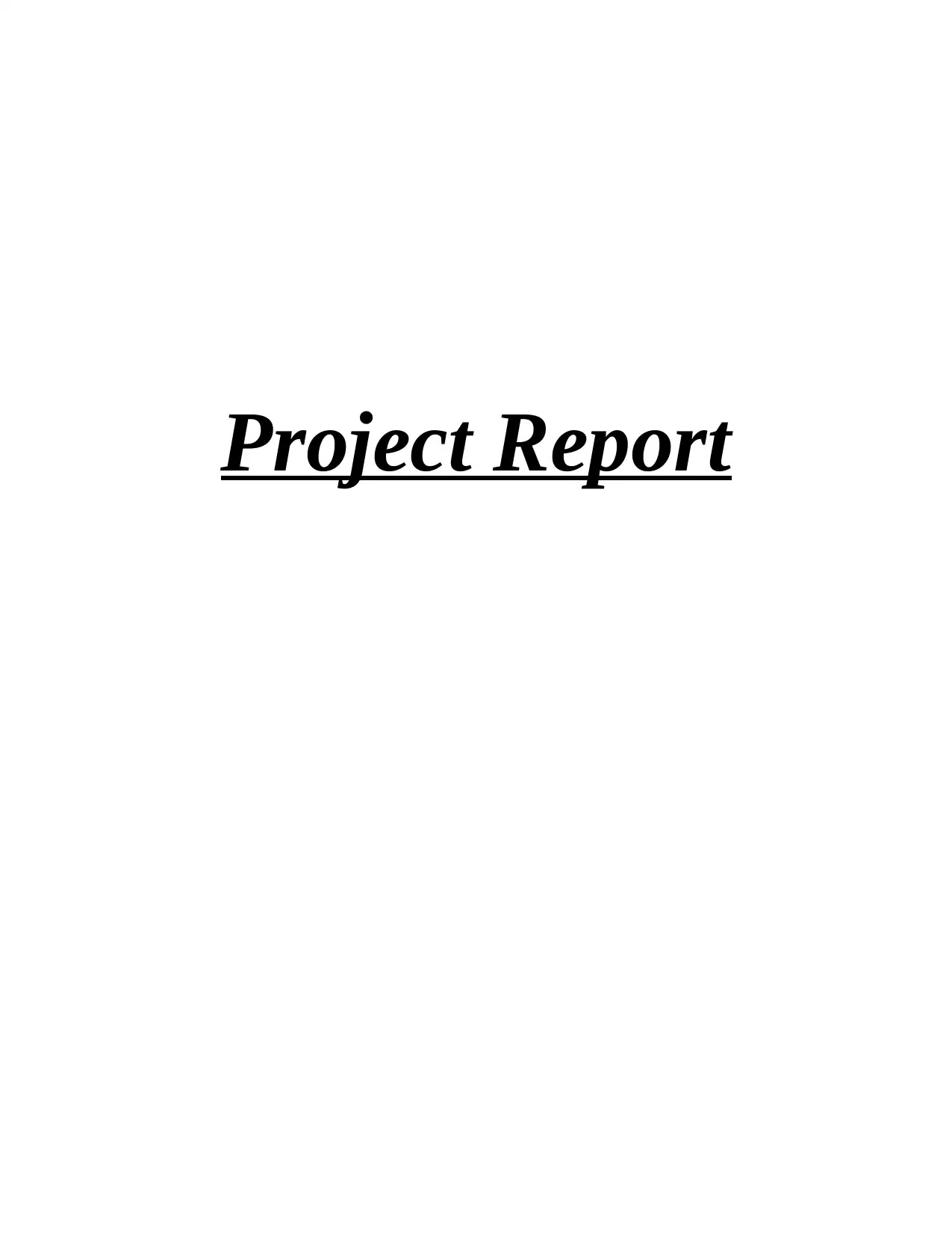
Project Report
Paraphrase This Document
Need a fresh take? Get an instant paraphrase of this document with our AI Paraphraser
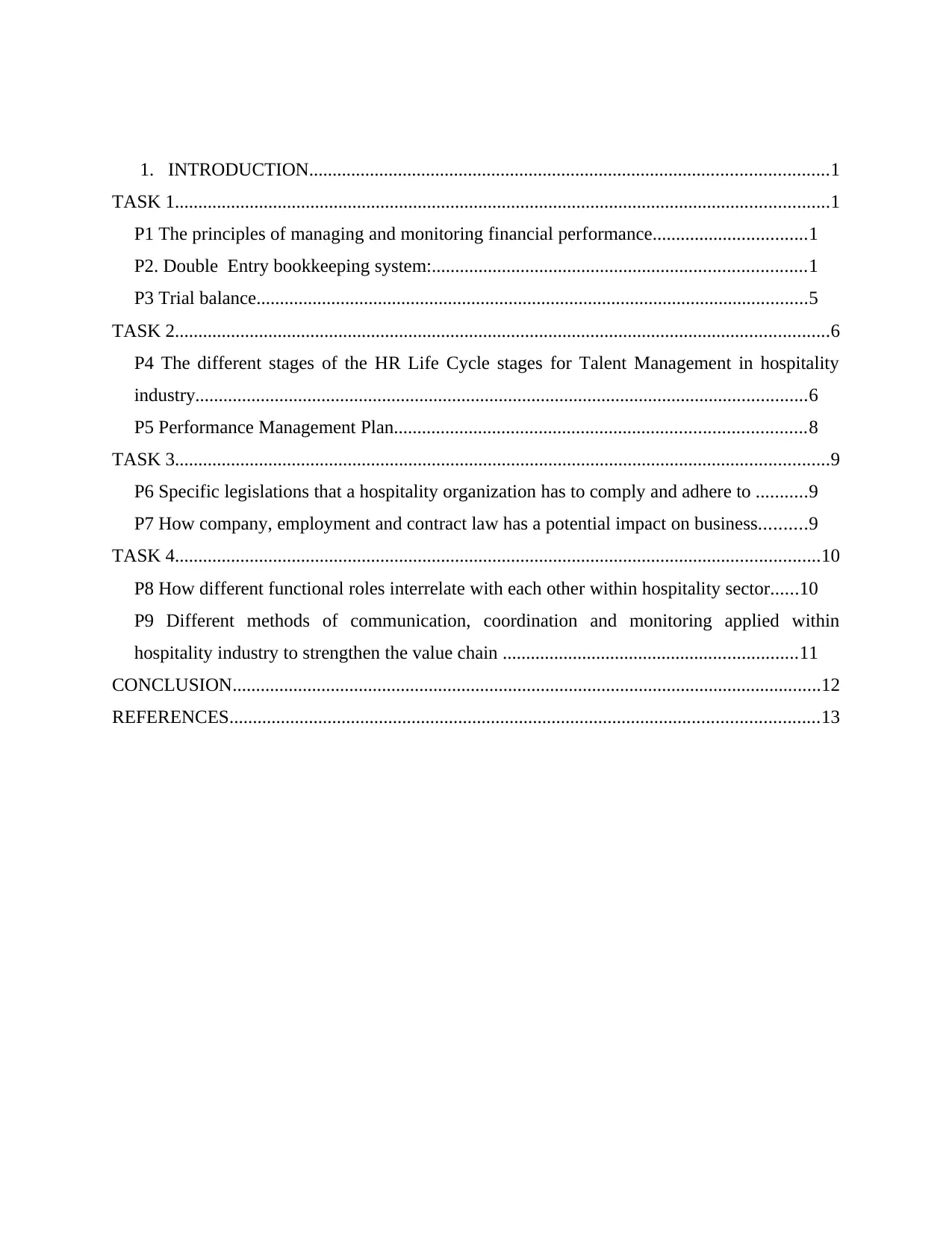
1. INTRODUCTION...............................................................................................................1
TASK 1............................................................................................................................................1
P1 The principles of managing and monitoring financial performance.................................1
P2. Double Entry bookkeeping system:................................................................................1
P3 Trial balance......................................................................................................................5
TASK 2............................................................................................................................................6
P4 The different stages of the HR Life Cycle stages for Talent Management in hospitality
industry...................................................................................................................................6
P5 Performance Management Plan........................................................................................8
TASK 3............................................................................................................................................9
P6 Specific legislations that a hospitality organization has to comply and adhere to ...........9
P7 How company, employment and contract law has a potential impact on business..........9
TASK 4..........................................................................................................................................10
P8 How different functional roles interrelate with each other within hospitality sector......10
P9 Different methods of communication, coordination and monitoring applied within
hospitality industry to strengthen the value chain ...............................................................11
CONCLUSION..............................................................................................................................12
REFERENCES..............................................................................................................................13
TASK 1............................................................................................................................................1
P1 The principles of managing and monitoring financial performance.................................1
P2. Double Entry bookkeeping system:................................................................................1
P3 Trial balance......................................................................................................................5
TASK 2............................................................................................................................................6
P4 The different stages of the HR Life Cycle stages for Talent Management in hospitality
industry...................................................................................................................................6
P5 Performance Management Plan........................................................................................8
TASK 3............................................................................................................................................9
P6 Specific legislations that a hospitality organization has to comply and adhere to ...........9
P7 How company, employment and contract law has a potential impact on business..........9
TASK 4..........................................................................................................................................10
P8 How different functional roles interrelate with each other within hospitality sector......10
P9 Different methods of communication, coordination and monitoring applied within
hospitality industry to strengthen the value chain ...............................................................11
CONCLUSION..............................................................................................................................12
REFERENCES..............................................................................................................................13
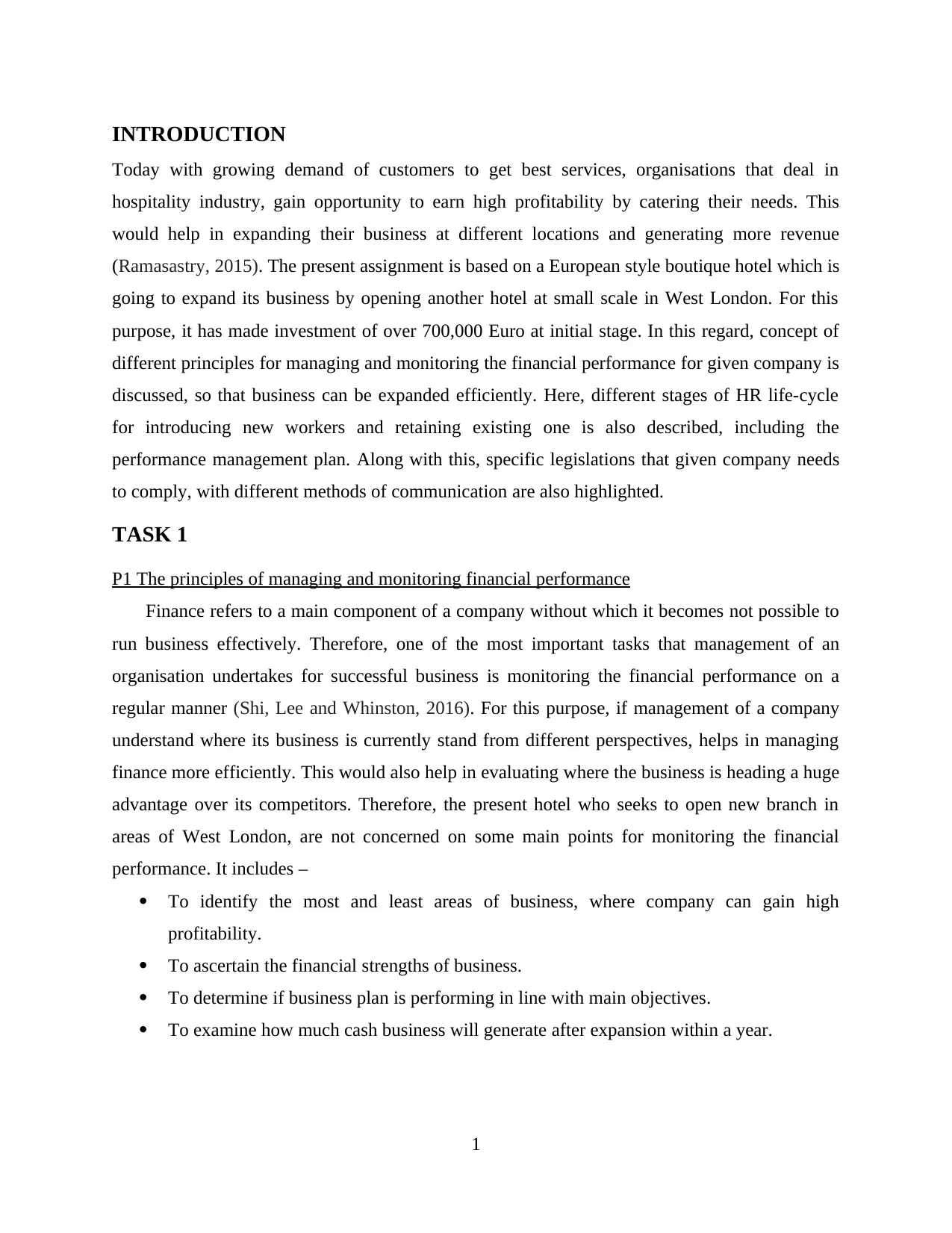
INTRODUCTION
Today with growing demand of customers to get best services, organisations that deal in
hospitality industry, gain opportunity to earn high profitability by catering their needs. This
would help in expanding their business at different locations and generating more revenue
(Ramasastry, 2015). The present assignment is based on a European style boutique hotel which is
going to expand its business by opening another hotel at small scale in West London. For this
purpose, it has made investment of over 700,000 Euro at initial stage. In this regard, concept of
different principles for managing and monitoring the financial performance for given company is
discussed, so that business can be expanded efficiently. Here, different stages of HR life-cycle
for introducing new workers and retaining existing one is also described, including the
performance management plan. Along with this, specific legislations that given company needs
to comply, with different methods of communication are also highlighted.
TASK 1
P1 The principles of managing and monitoring financial performance
Finance refers to a main component of a company without which it becomes not possible to
run business effectively. Therefore, one of the most important tasks that management of an
organisation undertakes for successful business is monitoring the financial performance on a
regular manner (Shi, Lee and Whinston, 2016). For this purpose, if management of a company
understand where its business is currently stand from different perspectives, helps in managing
finance more efficiently. This would also help in evaluating where the business is heading a huge
advantage over its competitors. Therefore, the present hotel who seeks to open new branch in
areas of West London, are not concerned on some main points for monitoring the financial
performance. It includes –
To identify the most and least areas of business, where company can gain high
profitability.
To ascertain the financial strengths of business.
To determine if business plan is performing in line with main objectives.
To examine how much cash business will generate after expansion within a year.
1
Today with growing demand of customers to get best services, organisations that deal in
hospitality industry, gain opportunity to earn high profitability by catering their needs. This
would help in expanding their business at different locations and generating more revenue
(Ramasastry, 2015). The present assignment is based on a European style boutique hotel which is
going to expand its business by opening another hotel at small scale in West London. For this
purpose, it has made investment of over 700,000 Euro at initial stage. In this regard, concept of
different principles for managing and monitoring the financial performance for given company is
discussed, so that business can be expanded efficiently. Here, different stages of HR life-cycle
for introducing new workers and retaining existing one is also described, including the
performance management plan. Along with this, specific legislations that given company needs
to comply, with different methods of communication are also highlighted.
TASK 1
P1 The principles of managing and monitoring financial performance
Finance refers to a main component of a company without which it becomes not possible to
run business effectively. Therefore, one of the most important tasks that management of an
organisation undertakes for successful business is monitoring the financial performance on a
regular manner (Shi, Lee and Whinston, 2016). For this purpose, if management of a company
understand where its business is currently stand from different perspectives, helps in managing
finance more efficiently. This would also help in evaluating where the business is heading a huge
advantage over its competitors. Therefore, the present hotel who seeks to open new branch in
areas of West London, are not concerned on some main points for monitoring the financial
performance. It includes –
To identify the most and least areas of business, where company can gain high
profitability.
To ascertain the financial strengths of business.
To determine if business plan is performing in line with main objectives.
To examine how much cash business will generate after expansion within a year.
1
⊘ This is a preview!⊘
Do you want full access?
Subscribe today to unlock all pages.

Trusted by 1+ million students worldwide
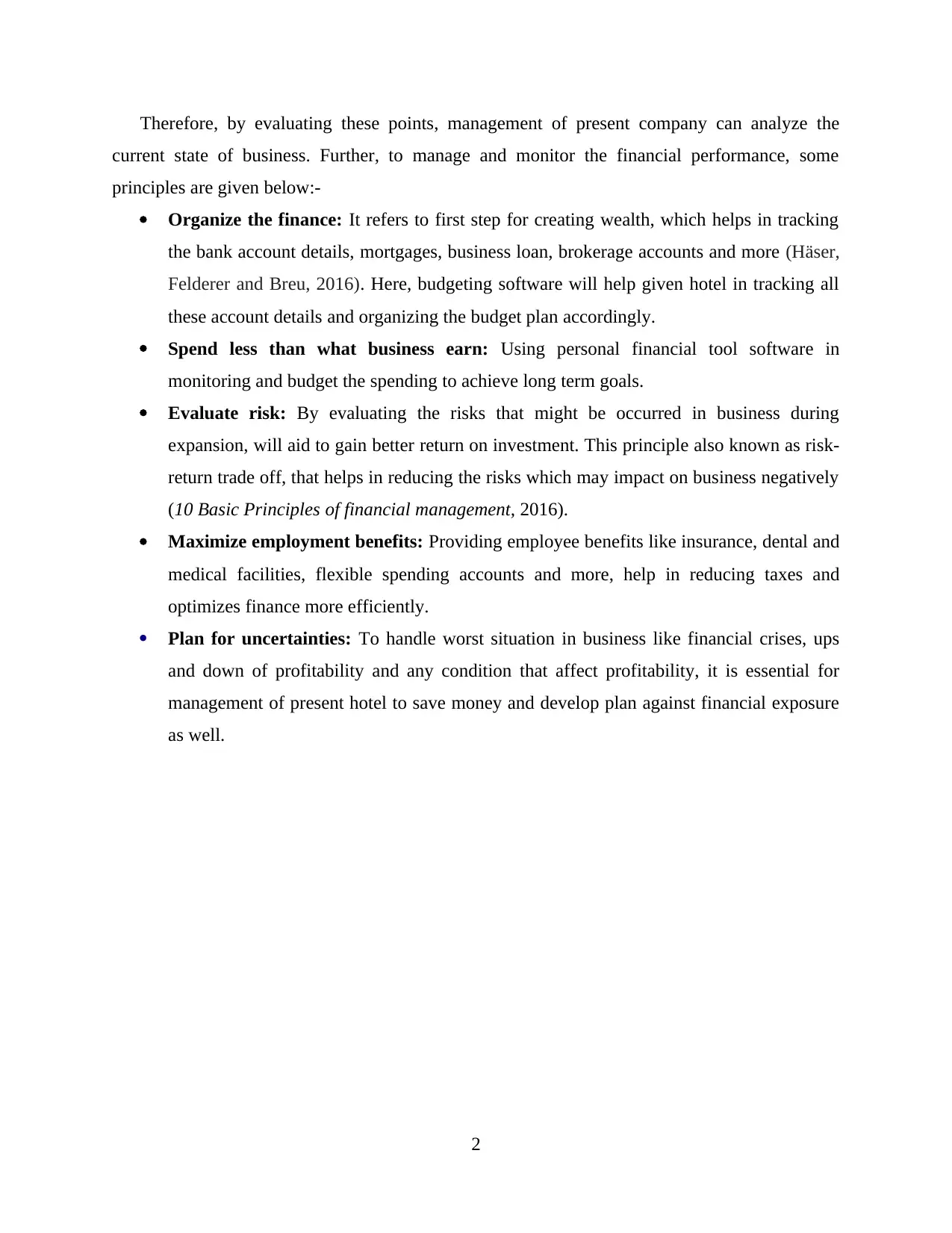
Therefore, by evaluating these points, management of present company can analyze the
current state of business. Further, to manage and monitor the financial performance, some
principles are given below:-
Organize the finance: It refers to first step for creating wealth, which helps in tracking
the bank account details, mortgages, business loan, brokerage accounts and more (Häser,
Felderer and Breu, 2016). Here, budgeting software will help given hotel in tracking all
these account details and organizing the budget plan accordingly.
Spend less than what business earn: Using personal financial tool software in
monitoring and budget the spending to achieve long term goals.
Evaluate risk: By evaluating the risks that might be occurred in business during
expansion, will aid to gain better return on investment. This principle also known as risk-
return trade off, that helps in reducing the risks which may impact on business negatively
(10 Basic Principles of financial management, 2016).
Maximize employment benefits: Providing employee benefits like insurance, dental and
medical facilities, flexible spending accounts and more, help in reducing taxes and
optimizes finance more efficiently.
Plan for uncertainties: To handle worst situation in business like financial crises, ups
and down of profitability and any condition that affect profitability, it is essential for
management of present hotel to save money and develop plan against financial exposure
as well.
2
current state of business. Further, to manage and monitor the financial performance, some
principles are given below:-
Organize the finance: It refers to first step for creating wealth, which helps in tracking
the bank account details, mortgages, business loan, brokerage accounts and more (Häser,
Felderer and Breu, 2016). Here, budgeting software will help given hotel in tracking all
these account details and organizing the budget plan accordingly.
Spend less than what business earn: Using personal financial tool software in
monitoring and budget the spending to achieve long term goals.
Evaluate risk: By evaluating the risks that might be occurred in business during
expansion, will aid to gain better return on investment. This principle also known as risk-
return trade off, that helps in reducing the risks which may impact on business negatively
(10 Basic Principles of financial management, 2016).
Maximize employment benefits: Providing employee benefits like insurance, dental and
medical facilities, flexible spending accounts and more, help in reducing taxes and
optimizes finance more efficiently.
Plan for uncertainties: To handle worst situation in business like financial crises, ups
and down of profitability and any condition that affect profitability, it is essential for
management of present hotel to save money and develop plan against financial exposure
as well.
2
Paraphrase This Document
Need a fresh take? Get an instant paraphrase of this document with our AI Paraphraser
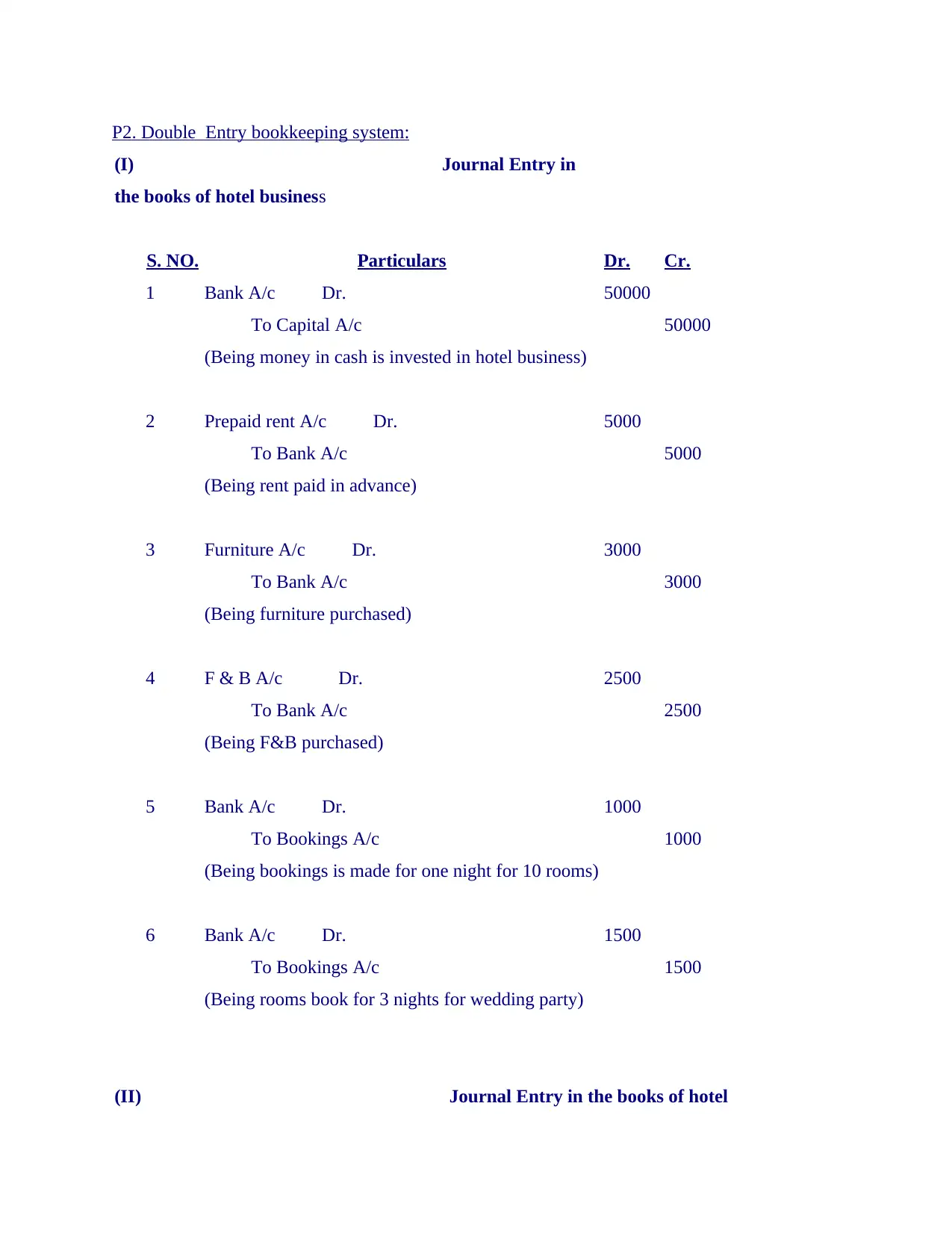
P2. Double Entry bookkeeping system:
(I) Journal Entry in
the books of hotel business
S. NO. Particulars Dr. Cr.
1 Bank A/c Dr. 50000
To Capital A/c 50000
(Being money in cash is invested in hotel business)
2 Prepaid rent A/c Dr. 5000
To Bank A/c 5000
(Being rent paid in advance)
3 Furniture A/c Dr. 3000
To Bank A/c 3000
(Being furniture purchased)
4 F & B A/c Dr. 2500
To Bank A/c 2500
(Being F&B purchased)
5 Bank A/c Dr. 1000
To Bookings A/c 1000
(Being bookings is made for one night for 10 rooms)
6 Bank A/c Dr. 1500
To Bookings A/c 1500
(Being rooms book for 3 nights for wedding party)
(II) Journal Entry in the books of hotel
(I) Journal Entry in
the books of hotel business
S. NO. Particulars Dr. Cr.
1 Bank A/c Dr. 50000
To Capital A/c 50000
(Being money in cash is invested in hotel business)
2 Prepaid rent A/c Dr. 5000
To Bank A/c 5000
(Being rent paid in advance)
3 Furniture A/c Dr. 3000
To Bank A/c 3000
(Being furniture purchased)
4 F & B A/c Dr. 2500
To Bank A/c 2500
(Being F&B purchased)
5 Bank A/c Dr. 1000
To Bookings A/c 1000
(Being bookings is made for one night for 10 rooms)
6 Bank A/c Dr. 1500
To Bookings A/c 1500
(Being rooms book for 3 nights for wedding party)
(II) Journal Entry in the books of hotel
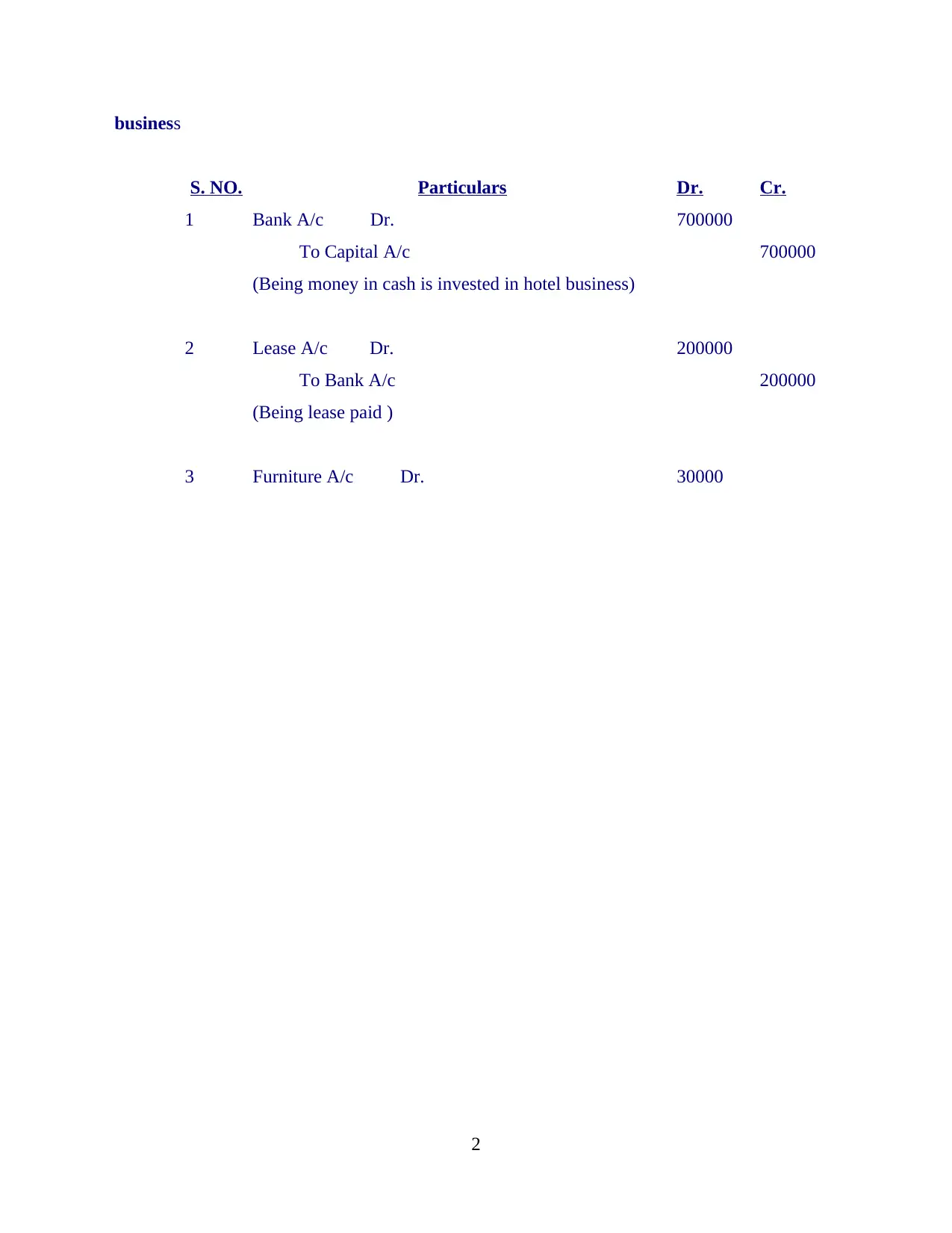
business
S. NO. Particulars Dr. Cr.
1 Bank A/c Dr. 700000
To Capital A/c 700000
(Being money in cash is invested in hotel business)
2 Lease A/c Dr. 200000
To Bank A/c 200000
(Being lease paid )
3 Furniture A/c Dr. 30000
2
S. NO. Particulars Dr. Cr.
1 Bank A/c Dr. 700000
To Capital A/c 700000
(Being money in cash is invested in hotel business)
2 Lease A/c Dr. 200000
To Bank A/c 200000
(Being lease paid )
3 Furniture A/c Dr. 30000
2
⊘ This is a preview!⊘
Do you want full access?
Subscribe today to unlock all pages.

Trusted by 1+ million students worldwide
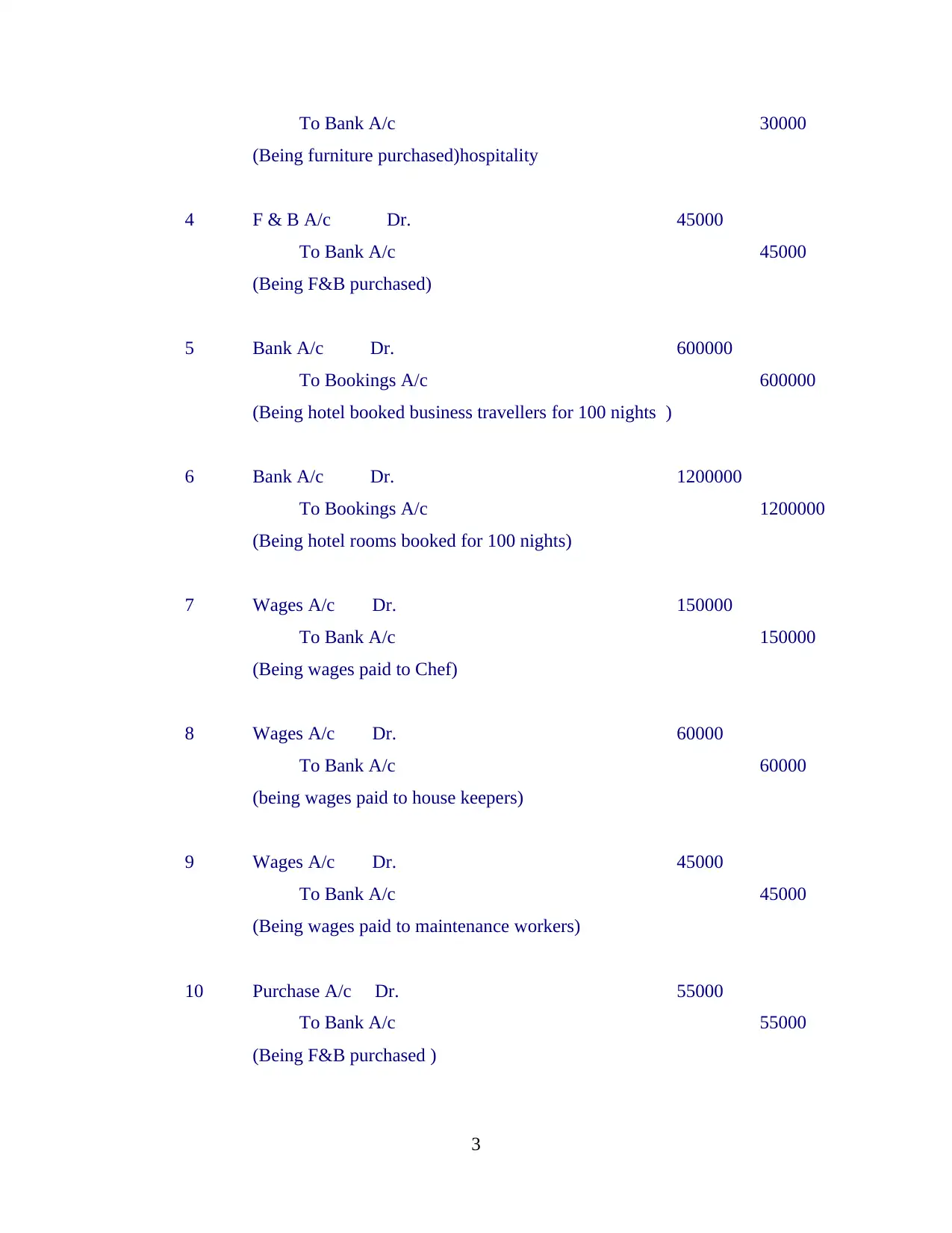
To Bank A/c 30000
(Being furniture purchased)hospitality
4 F & B A/c Dr. 45000
To Bank A/c 45000
(Being F&B purchased)
5 Bank A/c Dr. 600000
To Bookings A/c 600000
(Being hotel booked business travellers for 100 nights )
6 Bank A/c Dr. 1200000
To Bookings A/c 1200000
(Being hotel rooms booked for 100 nights)
7 Wages A/c Dr. 150000
To Bank A/c 150000
(Being wages paid to Chef)
8 Wages A/c Dr. 60000
To Bank A/c 60000
(being wages paid to house keepers)
9 Wages A/c Dr. 45000
To Bank A/c 45000
(Being wages paid to maintenance workers)
10 Purchase A/c Dr. 55000
To Bank A/c 55000
(Being F&B purchased )
3
(Being furniture purchased)hospitality
4 F & B A/c Dr. 45000
To Bank A/c 45000
(Being F&B purchased)
5 Bank A/c Dr. 600000
To Bookings A/c 600000
(Being hotel booked business travellers for 100 nights )
6 Bank A/c Dr. 1200000
To Bookings A/c 1200000
(Being hotel rooms booked for 100 nights)
7 Wages A/c Dr. 150000
To Bank A/c 150000
(Being wages paid to Chef)
8 Wages A/c Dr. 60000
To Bank A/c 60000
(being wages paid to house keepers)
9 Wages A/c Dr. 45000
To Bank A/c 45000
(Being wages paid to maintenance workers)
10 Purchase A/c Dr. 55000
To Bank A/c 55000
(Being F&B purchased )
3
Paraphrase This Document
Need a fresh take? Get an instant paraphrase of this document with our AI Paraphraser
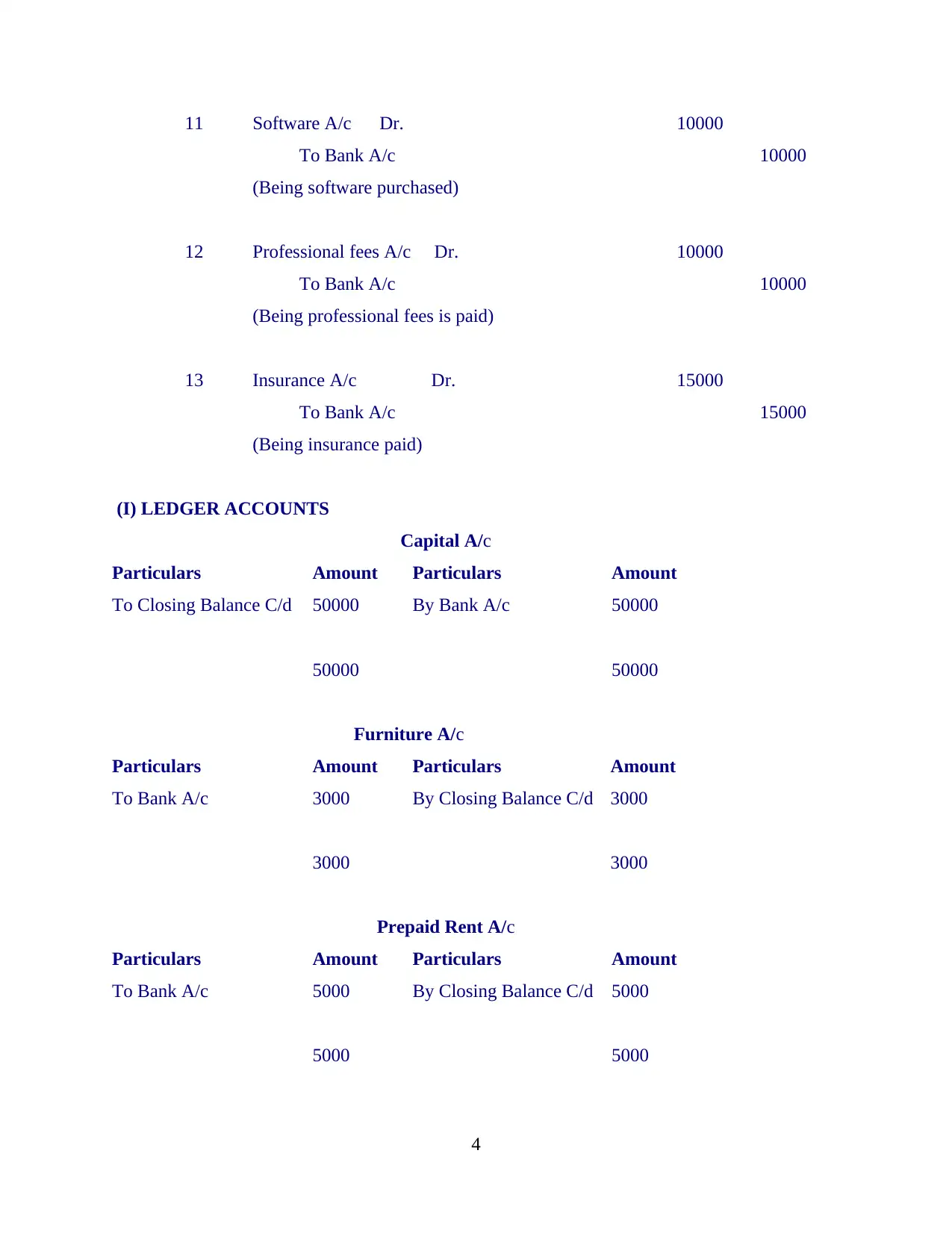
11 Software A/c Dr. 10000
To Bank A/c 10000
(Being software purchased)
12 Professional fees A/c Dr. 10000
To Bank A/c 10000
(Being professional fees is paid)
13 Insurance A/c Dr. 15000
To Bank A/c 15000
(Being insurance paid)
(I) LEDGER ACCOUNTS
Capital A/c
Particulars Amount Particulars Amount
To Closing Balance C/d 50000 By Bank A/c 50000
50000 50000
Furniture A/c
Particulars Amount Particulars Amount
To Bank A/c 3000 By Closing Balance C/d 3000
3000 3000
Prepaid Rent A/c
Particulars Amount Particulars Amount
To Bank A/c 5000 By Closing Balance C/d 5000
5000 5000
4
To Bank A/c 10000
(Being software purchased)
12 Professional fees A/c Dr. 10000
To Bank A/c 10000
(Being professional fees is paid)
13 Insurance A/c Dr. 15000
To Bank A/c 15000
(Being insurance paid)
(I) LEDGER ACCOUNTS
Capital A/c
Particulars Amount Particulars Amount
To Closing Balance C/d 50000 By Bank A/c 50000
50000 50000
Furniture A/c
Particulars Amount Particulars Amount
To Bank A/c 3000 By Closing Balance C/d 3000
3000 3000
Prepaid Rent A/c
Particulars Amount Particulars Amount
To Bank A/c 5000 By Closing Balance C/d 5000
5000 5000
4
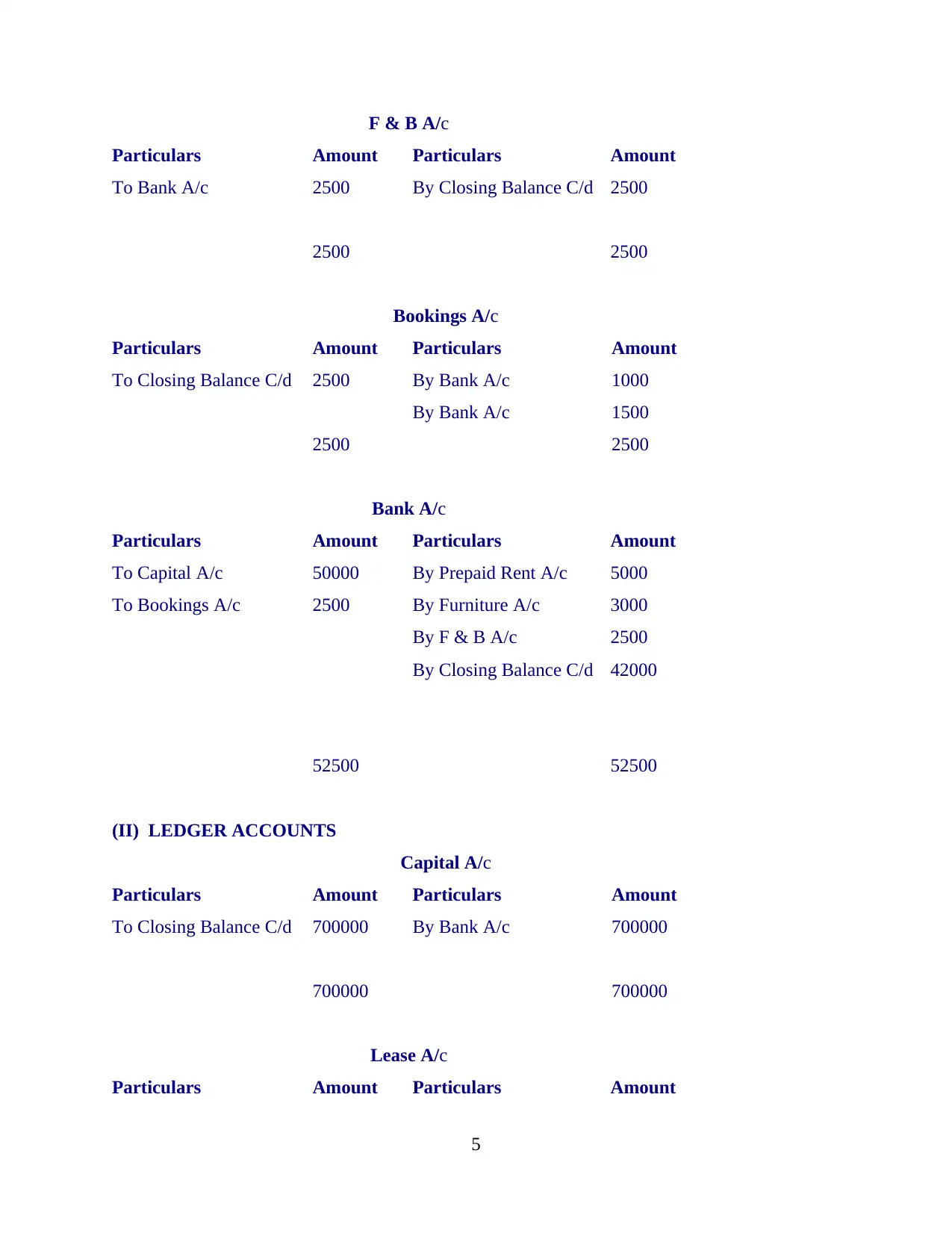
F & B A/c
Particulars Amount Particulars Amount
To Bank A/c 2500 By Closing Balance C/d 2500
2500 2500
Bookings A/c
Particulars Amount Particulars Amount
To Closing Balance C/d 2500 By Bank A/c 1000
By Bank A/c 1500
2500 2500
Bank A/c
Particulars Amount Particulars Amount
To Capital A/c 50000 By Prepaid Rent A/c 5000
To Bookings A/c 2500 By Furniture A/c 3000
By F & B A/c 2500
By Closing Balance C/d 42000
52500 52500
(II) LEDGER ACCOUNTS
Capital A/c
Particulars Amount Particulars Amount
To Closing Balance C/d 700000 By Bank A/c 700000
700000 700000
Lease A/c
Particulars Amount Particulars Amount
5
Particulars Amount Particulars Amount
To Bank A/c 2500 By Closing Balance C/d 2500
2500 2500
Bookings A/c
Particulars Amount Particulars Amount
To Closing Balance C/d 2500 By Bank A/c 1000
By Bank A/c 1500
2500 2500
Bank A/c
Particulars Amount Particulars Amount
To Capital A/c 50000 By Prepaid Rent A/c 5000
To Bookings A/c 2500 By Furniture A/c 3000
By F & B A/c 2500
By Closing Balance C/d 42000
52500 52500
(II) LEDGER ACCOUNTS
Capital A/c
Particulars Amount Particulars Amount
To Closing Balance C/d 700000 By Bank A/c 700000
700000 700000
Lease A/c
Particulars Amount Particulars Amount
5
⊘ This is a preview!⊘
Do you want full access?
Subscribe today to unlock all pages.

Trusted by 1+ million students worldwide
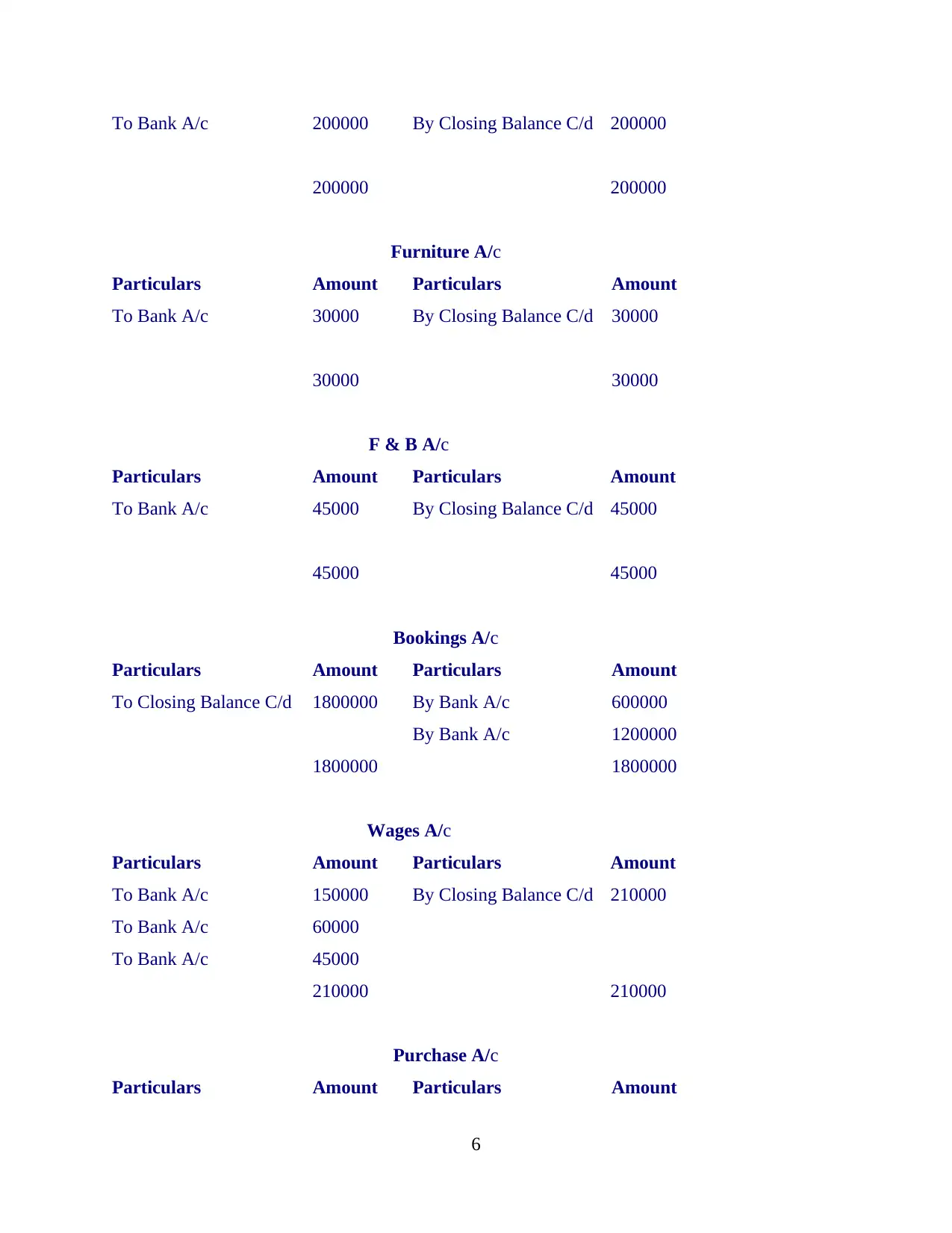
To Bank A/c 200000 By Closing Balance C/d 200000
200000 200000
Furniture A/c
Particulars Amount Particulars Amount
To Bank A/c 30000 By Closing Balance C/d 30000
30000 30000
F & B A/c
Particulars Amount Particulars Amount
To Bank A/c 45000 By Closing Balance C/d 45000
45000 45000
Bookings A/c
Particulars Amount Particulars Amount
To Closing Balance C/d 1800000 By Bank A/c 600000
By Bank A/c 1200000
1800000 1800000
Wages A/c
Particulars Amount Particulars Amount
To Bank A/c 150000 By Closing Balance C/d 210000
To Bank A/c 60000
To Bank A/c 45000
210000 210000
Purchase A/c
Particulars Amount Particulars Amount
6
200000 200000
Furniture A/c
Particulars Amount Particulars Amount
To Bank A/c 30000 By Closing Balance C/d 30000
30000 30000
F & B A/c
Particulars Amount Particulars Amount
To Bank A/c 45000 By Closing Balance C/d 45000
45000 45000
Bookings A/c
Particulars Amount Particulars Amount
To Closing Balance C/d 1800000 By Bank A/c 600000
By Bank A/c 1200000
1800000 1800000
Wages A/c
Particulars Amount Particulars Amount
To Bank A/c 150000 By Closing Balance C/d 210000
To Bank A/c 60000
To Bank A/c 45000
210000 210000
Purchase A/c
Particulars Amount Particulars Amount
6
Paraphrase This Document
Need a fresh take? Get an instant paraphrase of this document with our AI Paraphraser
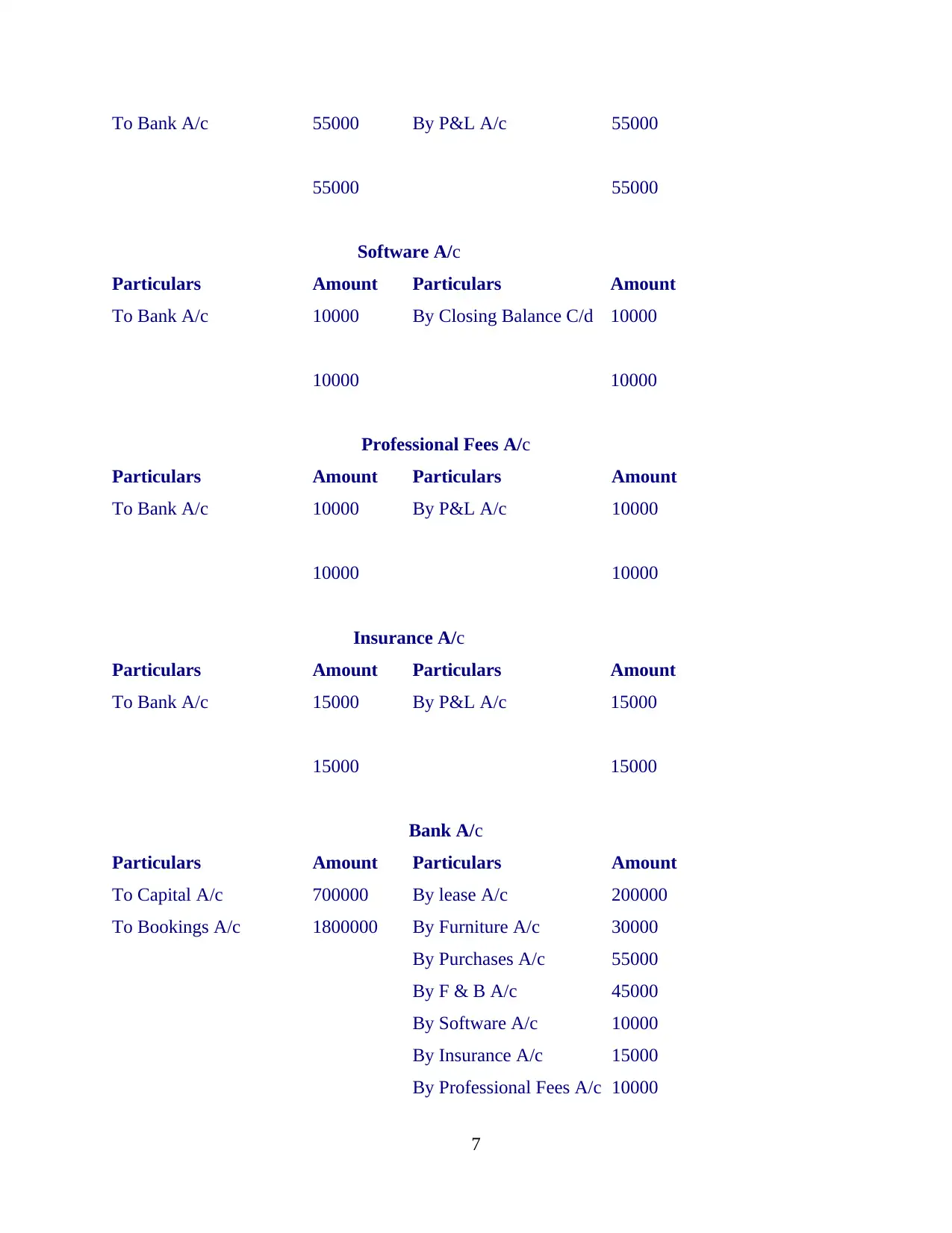
To Bank A/c 55000 By P&L A/c 55000
55000 55000
Software A/c
Particulars Amount Particulars Amount
To Bank A/c 10000 By Closing Balance C/d 10000
10000 10000
Professional Fees A/c
Particulars Amount Particulars Amount
To Bank A/c 10000 By P&L A/c 10000
10000 10000
Insurance A/c
Particulars Amount Particulars Amount
To Bank A/c 15000 By P&L A/c 15000
15000 15000
Bank A/c
Particulars Amount Particulars Amount
To Capital A/c 700000 By lease A/c 200000
To Bookings A/c 1800000 By Furniture A/c 30000
By Purchases A/c 55000
By F & B A/c 45000
By Software A/c 10000
By Insurance A/c 15000
By Professional Fees A/c 10000
7
55000 55000
Software A/c
Particulars Amount Particulars Amount
To Bank A/c 10000 By Closing Balance C/d 10000
10000 10000
Professional Fees A/c
Particulars Amount Particulars Amount
To Bank A/c 10000 By P&L A/c 10000
10000 10000
Insurance A/c
Particulars Amount Particulars Amount
To Bank A/c 15000 By P&L A/c 15000
15000 15000
Bank A/c
Particulars Amount Particulars Amount
To Capital A/c 700000 By lease A/c 200000
To Bookings A/c 1800000 By Furniture A/c 30000
By Purchases A/c 55000
By F & B A/c 45000
By Software A/c 10000
By Insurance A/c 15000
By Professional Fees A/c 10000
7
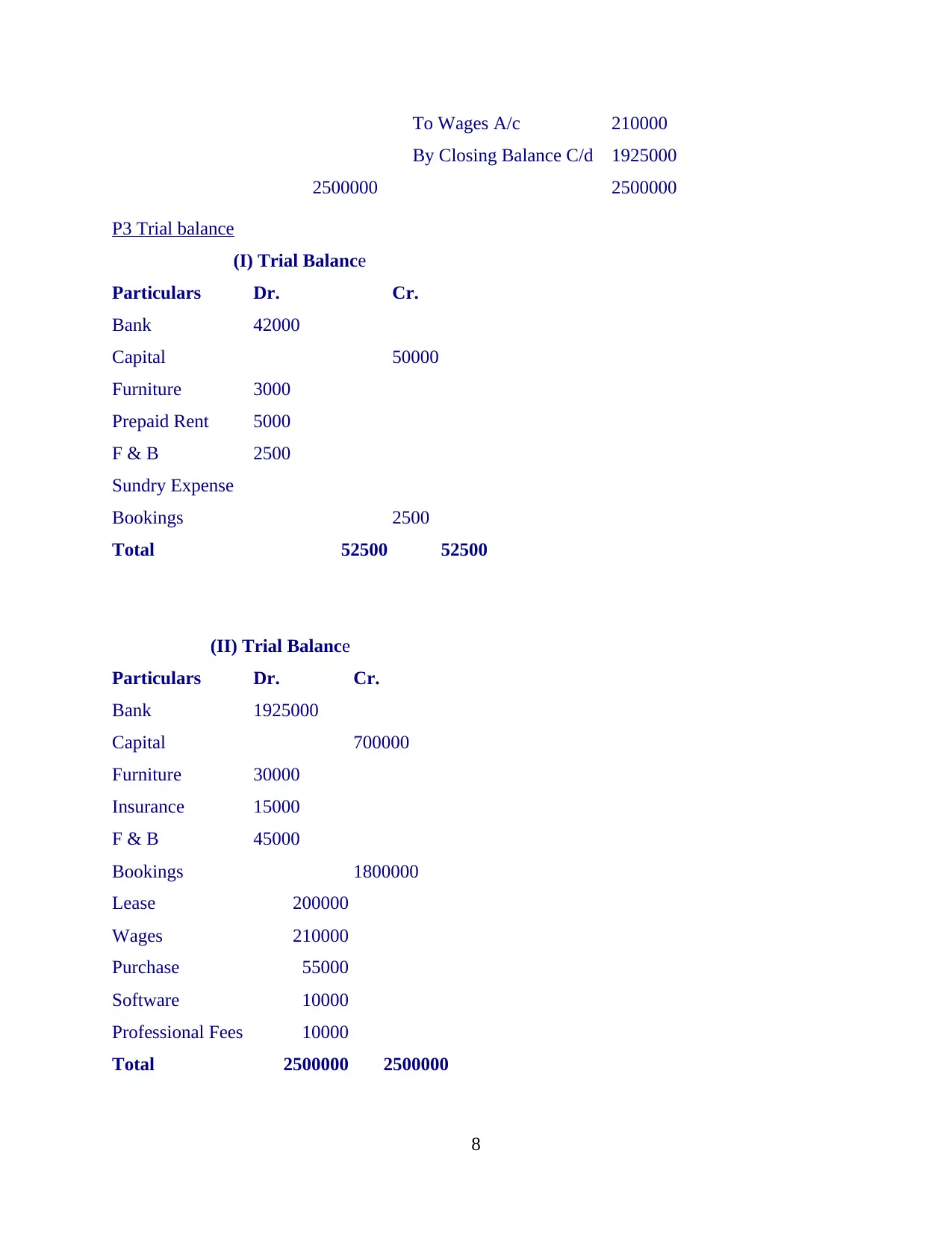
To Wages A/c 210000
By Closing Balance C/d 1925000
2500000 2500000
P3 Trial balance
(I) Trial Balance
Particulars Dr. Cr.
Bank 42000
Capital 50000
Furniture 3000
Prepaid Rent 5000
F & B 2500
Sundry Expense
Bookings 2500
Total 52500 52500
(II) Trial Balance
Particulars Dr. Cr.
Bank 1925000
Capital 700000
Furniture 30000
Insurance 15000
F & B 45000
Bookings 1800000
Lease 200000
Wages 210000
Purchase 55000
Software 10000
Professional Fees 10000
Total 2500000 2500000
8
By Closing Balance C/d 1925000
2500000 2500000
P3 Trial balance
(I) Trial Balance
Particulars Dr. Cr.
Bank 42000
Capital 50000
Furniture 3000
Prepaid Rent 5000
F & B 2500
Sundry Expense
Bookings 2500
Total 52500 52500
(II) Trial Balance
Particulars Dr. Cr.
Bank 1925000
Capital 700000
Furniture 30000
Insurance 15000
F & B 45000
Bookings 1800000
Lease 200000
Wages 210000
Purchase 55000
Software 10000
Professional Fees 10000
Total 2500000 2500000
8
⊘ This is a preview!⊘
Do you want full access?
Subscribe today to unlock all pages.

Trusted by 1+ million students worldwide
1 out of 18
Related Documents
Your All-in-One AI-Powered Toolkit for Academic Success.
+13062052269
info@desklib.com
Available 24*7 on WhatsApp / Email
![[object Object]](/_next/static/media/star-bottom.7253800d.svg)
Unlock your academic potential
Copyright © 2020–2026 A2Z Services. All Rights Reserved. Developed and managed by ZUCOL.




